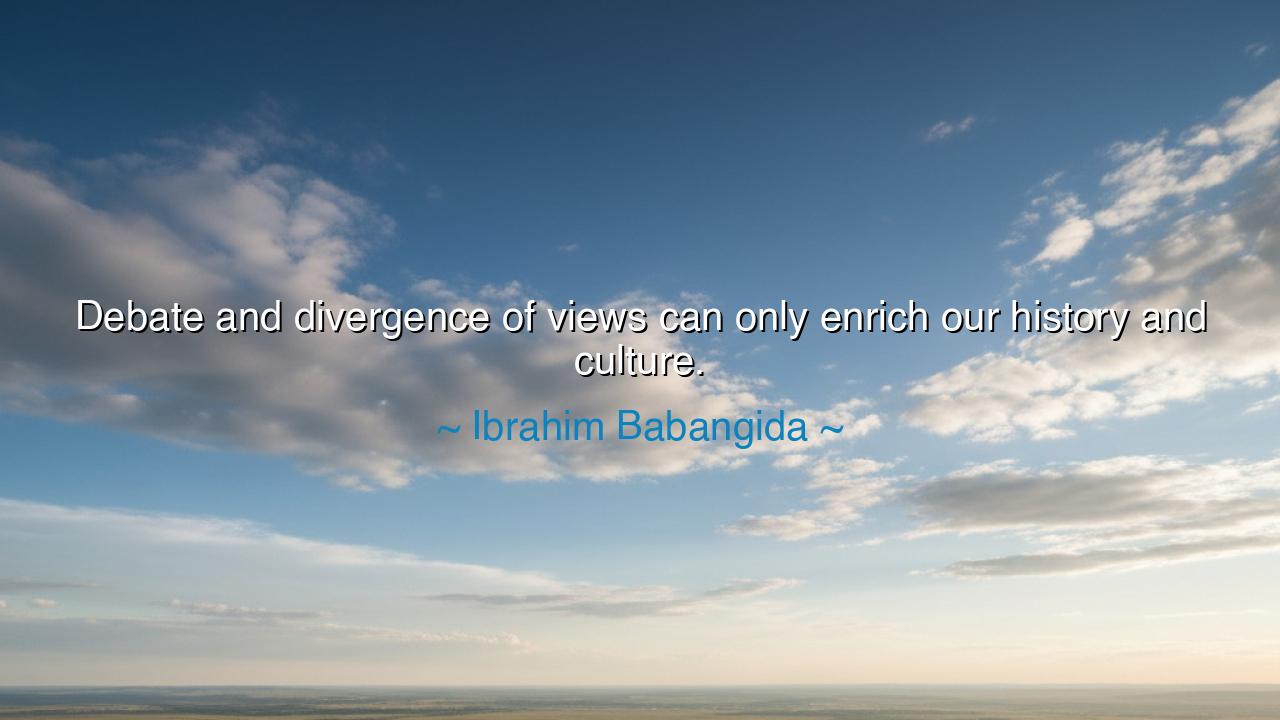
Debate and divergence of views can only enrich our history and






The former Nigerian leader Ibrahim Babangida once spoke with a statesman’s clarity and wisdom when he said: “Debate and divergence of views can only enrich our history and culture.” In this single sentence lies the essence of a truth as old as civilization itself — that the clash of ideas is not a sign of weakness, but of strength; that societies grow not through silence and conformity, but through dialogue, disagreement, and discovery. It is a reminder that the measure of a people’s greatness lies not in how uniform they are, but in how freely they can think, question, and challenge one another without fear.
To understand the origin and spirit of this quote, one must look to the complex and turbulent world of Nigerian politics in the late twentieth century. Babangida ruled during an era of transition — a time when Nigeria, like many nations, wrestled with the balance between order and freedom, unity and diversity. He spoke these words as both a soldier and a leader aware that true unity cannot be forged by silencing difference, but by allowing voices to contend and to shape one another. For in a nation as vast and varied as Nigeria — with its hundreds of tongues, tribes, and traditions — only through debate could the people find not division, but understanding. His words were both a reflection and a challenge: that to build a nation is to welcome dissent as the fire that tempers steel.
From the dawn of history, the power of debate has been the engine of progress. In the ancient agora of Athens, the philosophers argued from sunrise to dusk — Socrates, Plato, Aristotle — each testing ideas like a blacksmith hammers iron. Their disagreements gave birth to philosophy, democracy, and reason itself. So too in the councils of Rome, the republic endured only as long as men dared to speak their minds in defense of the common good. And when voices were silenced, when emperors demanded obedience rather than discussion, decay swiftly followed. Thus, the ancients learned what Babangida echoed centuries later: divergence of views is the lifeblood of civilization.
History is rich with the fruits of constructive conflict. Consider the birth of the United States, where thirteen colonies — each different in creed and interest — gathered to shape a new republic. Their debates were fierce; their arguments, at times, bitter. Yet from that crucible of disagreement came a Constitution that has endured for centuries. It was not uniformity that built it, but compromise and courage — the willingness to listen, to reason, and to yield when truth demanded it. Where there is debate, there is refinement; where there is divergence, there is growth.
But there is also a deeper wisdom in Babangida’s words — a warning that when societies crush debate, they crush their own future. When rulers fear dissent, when citizens despise those who think differently, a nation begins to wither from within. Culture stagnates, and history loses its richness. Diversity of thought is not chaos; it is creation. The mind that questions is the forge of progress. As rivers gain strength when many tributaries join them, so too does a people’s spirit grow stronger when many ideas converge, challenge, and renew one another.
This truth applies not only to nations but to every human soul. Each of us is a small world of beliefs, shaped by what we dare to question and what we dare to hear. To debate with others is to refine our understanding, to stretch the boundaries of what we know. Those who fear disagreement remain prisoners of their own certainty. But those who welcome it — who listen with humility and speak with courage — become builders of wisdom. For in every argument lies an opportunity to see more clearly, to grow more deeply, to become more human.
Therefore, let this be the lesson: do not fear divergence — seek it. In your communities, your schools, your families, invite voices that differ from your own. Debate not to conquer, but to understand; speak not to silence, but to enlighten. For every culture, every era, every generation is made richer by the dialogue between its hearts and minds. As Ibrahim Babangida taught, the strength of a nation — and of a person — lies not in sameness, but in the harmony that arises when many voices dare to sing together.
And so, remember this truth: unity is not the absence of difference, but the mastery of it. To build a history worth remembering and a culture worth inheriting, we must learn to speak, to listen, and to challenge — for in the sacred space between agreement and dissent, humanity finds its greatness.






AAdministratorAdministrator
Welcome, honored guests. Please leave a comment, we will respond soon